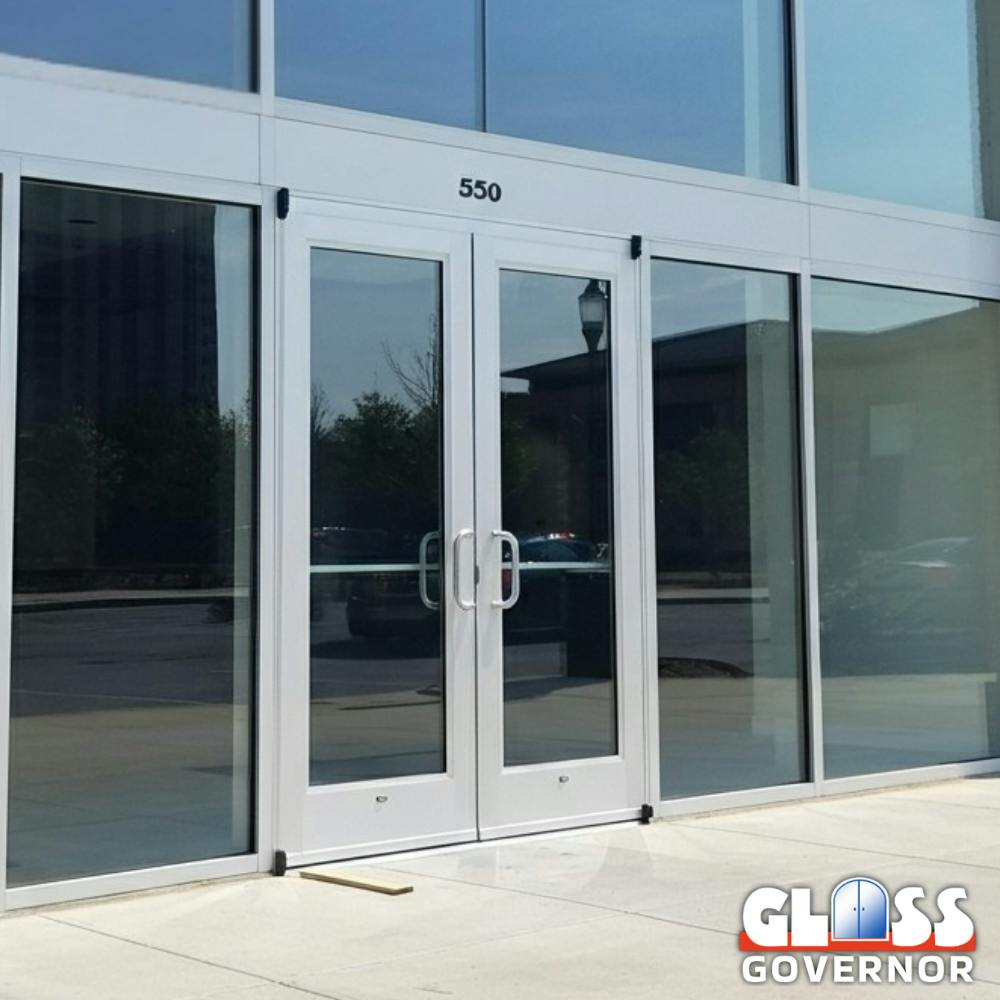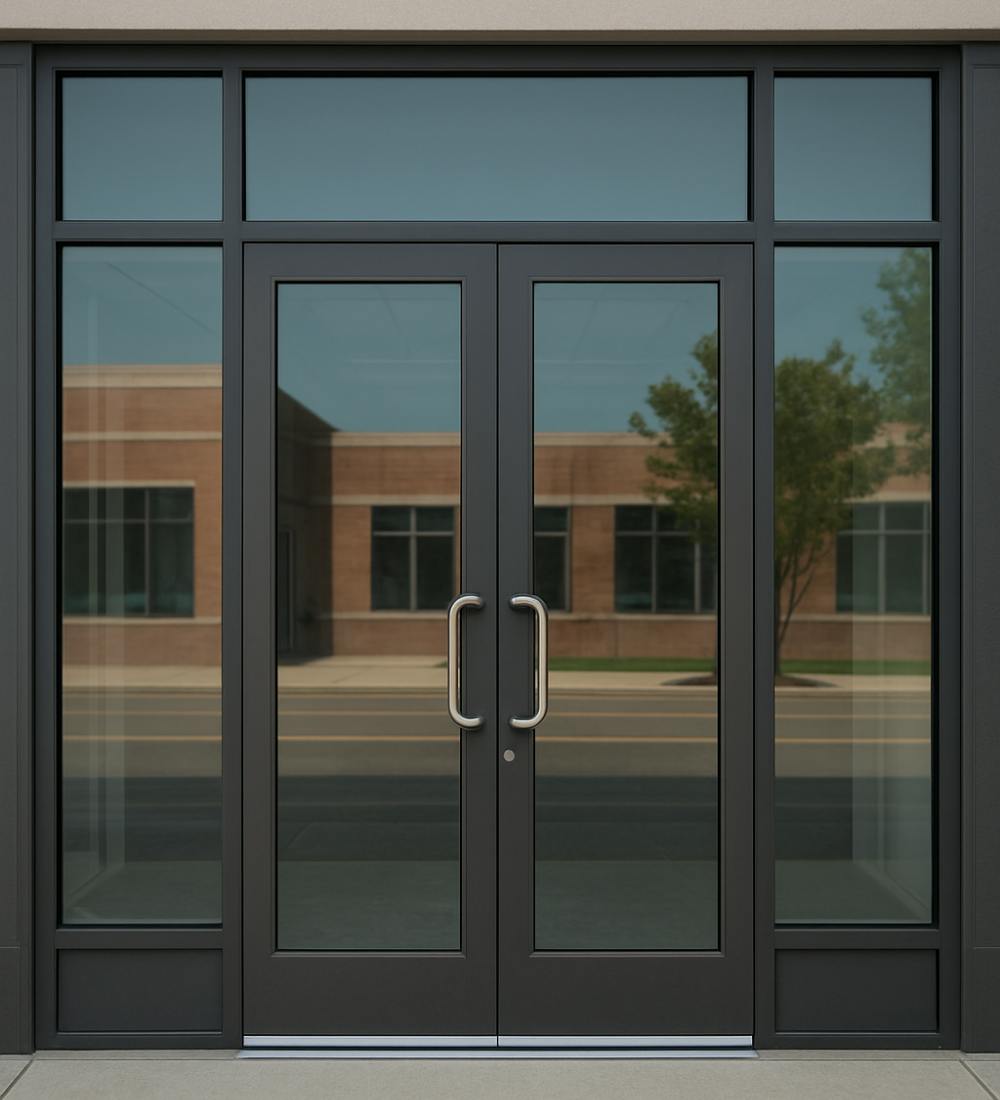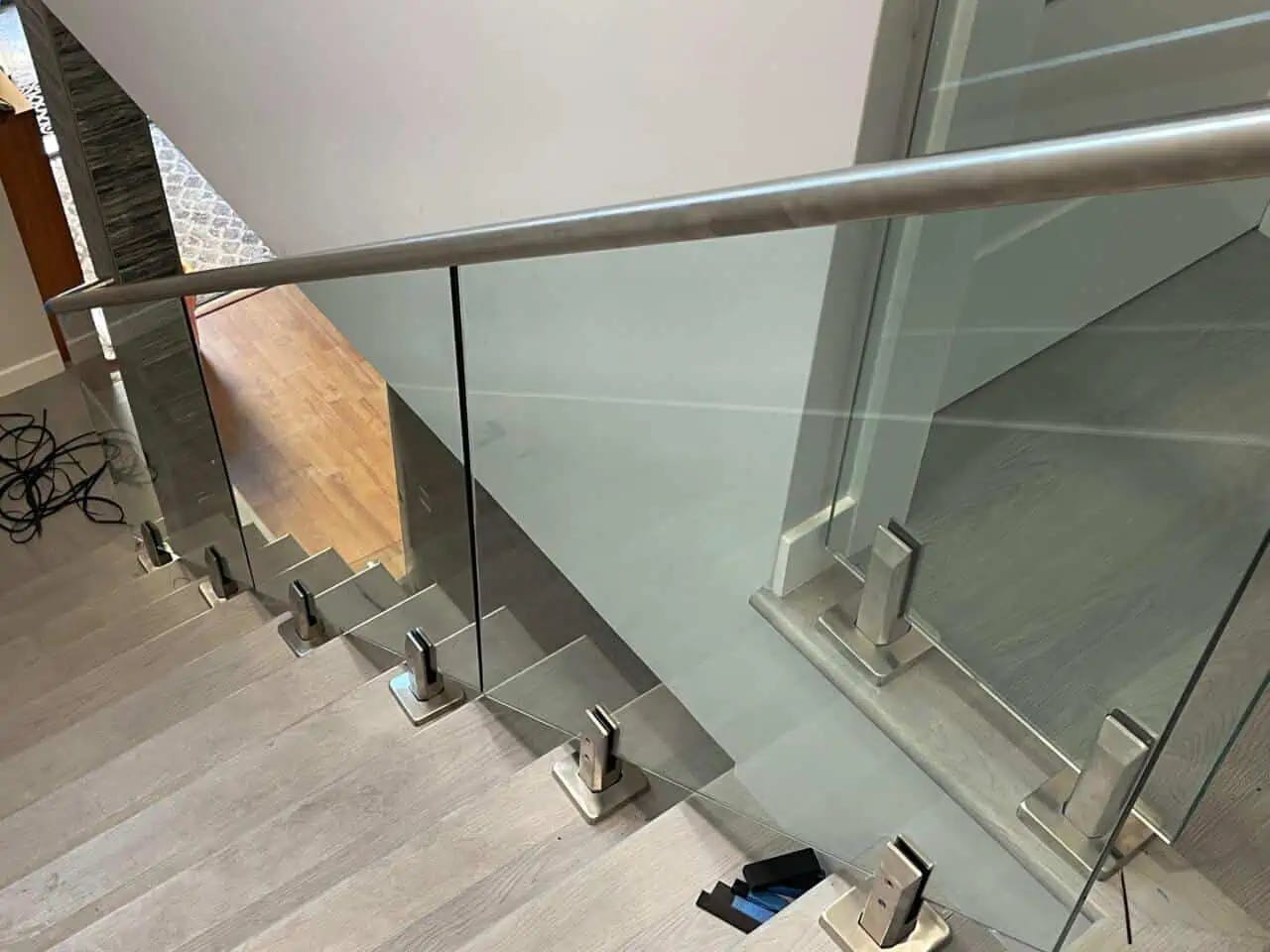Glass upgrades for Atlanta homes deliver returns most homeowners never expect—and that’s exactly the problem.
Walk into any open house in Buckhead or Alpharetta, and you’ll notice something: the homes that sell fastest and command premium prices share a common feature. It’s not granite countertops or hardwood floors (everyone has those). It’s the strategic use of architectural glass.
Frameless shower doors. Glass railings on decks. Smart glass partitions in home offices. These aren’t just aesthetic choices. They’re investments that quietly increase property values by 8-15% while cutting energy bills and maintenance costs.
Yet most homeowners skip right past them, choosing cheaper alternatives that look dated within five years. When planning glass installation in Atlanta, understanding the actual ROI makes all the difference.
Why? Because no one talks about the actual numbers. The energy savings data. The maintenance cost comparisons over decades. Until now.
Let’s dig into seven findings about residential glass upgrades that surprised even us—and why Atlanta’s climate makes these custom glass solutions even more valuable than in other parts of the country.
1. Frameless Glass Railings Block 40% Less Light Than Traditional Railings (And Add 8-15% to Home Value)
Here’s something most deck builders won’t tell you upfront: traditional wood or metal railings block up to 40% of available natural light.
Think about that for a second. You pay for a deck with a view, then immediately obstruct nearly half the light and sightlines with balusters. It’s like buying a sports car and driving it in second gear.
Glass railings eliminate this problem entirely. Frameless systems create unobstructed views while still meeting strict building codes for safety. You get the protection you need without the visual barrier.
But here’s where it gets interesting financially: these architectural glass installations increase property values by 8-15% and typically recoup 75-85% of installation costs at resale. For a $300,000 home, that’s a potential value increase of $24,000 to $45,000.
Why This Matters in Atlanta
Atlanta’s humid climate destroys wood railings faster than in drier regions. Rot, warping, and constant maintenance make wood a losing proposition. Glass doesn’t have these issues. It handles humidity, rain, and heat without deteriorating—one of the most climate-appropriate glass materials you can choose.
You install frameless glass railings for decks once and you’re done. No annual staining. No replacing rotted boards. No repainting rusted metal. The maintenance savings over 10 years can easily exceed $2,000—money you keep instead of spending on upkeep.
Real estate agents across Gwinnett and Cobb counties know this. Properties with glass railings signal “premium” to buyers, and that perception translates directly into higher offers. When buyers ask “how much do glass railings cost in Atlanta,” they’re already thinking investment, not expense.
2. Frameless Shower Doors Make Bathrooms Feel 30-50% Larger (With a 60-70% ROI)
There’s a psychological trick happening in high-end bathroom design that most homeowners don’t recognize: visual space matters more than actual square footage.
A frameless shower door makes a bathroom appear 30-50% larger than the same space with a framed enclosure or shower curtain. Your eye travels uninterrupted across the entire room instead of stopping at a heavy frame or opaque barrier.
This perception shift matters tremendously when it comes to property value. Bathroom renovations are notorious for variable returns, but frameless shower installations deliver a consistent 60-70% ROI—making them some of the best glass shower doors for resale value.
The Atlanta Advantage
In humid climates, frameless shower doors offer another hidden benefit: better airflow. Metal frames trap moisture and develop mildew. Frameless systems dry faster and resist buildup, reducing cleaning time and extending the life of your bathroom finishes.
The typical cost for hinged shower doors in Atlanta ranges from $3,200 to $10,200, depending on size and customization. That might sound steep compared to a $500 shower curtain, but consider this: you’re not just buying a door. You’re buying a feature that makes your entire bathroom more valuable, more functional, and dramatically easier to maintain.
Tempered safety glass—required for all shower applications—is five times stronger than regular glass. It shatters into small, relatively harmless pieces if broken. You’re actually getting a safer solution than traditional materials while simultaneously upgrading aesthetics.
Homeowners planning bathroom renovations in Sandy Springs consistently report that frameless showers are the single upgrade guests notice and comment on most. That kind of “wow factor” translates directly to perceived home value.
3. Smart Glass Partitions Cut Energy Costs by 15-25% (While Creating Flexible Spaces)
This one catches most Atlanta business owners completely off guard: glass partitions can reduce energy consumption, not increase it.
Electrochromic and PDLC smart glass technology allows glass to switch between transparent and opaque states. With a button press or automated sensors, you control privacy and light without installing blinds or curtains—a perfect example of modern energy-efficient glass solutions.
The energy savings come from two sources:
First, smart glass reduces heat transfer by controlling how much sunlight penetrates your space. During hot Atlanta summers, you can switch glass to its opaque state during peak sun hours, reducing cooling costs by 15-25%.
Second, glass partitions maximize natural light distribution throughout a building, reducing dependence on artificial lighting. Studies show that architectural glass walls can cut lighting energy consumption by up to 40% in office environments.
The Commercial Impact
For Buckhead office spaces or coworking locations, this translates to thousands in annual energy savings. A 5,000-square-foot office using smart glass partitions could save $1,500 to $3,000 per year on utilities.
Installation costs run $100 to $175 per square foot for commercial glass solutions—a premium over standard glass. But when you calculate the energy savings, improved employee productivity (natural light reduces eyestrain and fatigue), and flexible space reconfiguration, the payback period is typically 5-7 years.
For office managers planning 2026 budgets, this is the kind of glass partition installation that pays for itself while making the workspace more attractive to talent. When employees search “glass partition installation near me,” they’re often looking for these exact benefits.
4. Low-E Glass Doors Reduce Heat Loss by 10-50% (Paying for Themselves Through Energy Savings)
Low-E (low-emissivity) glass sounds technical and expensive. In reality, it’s one of the simplest high-ROI upgrades available for Atlanta storefronts and entry doors.
Low-E coatings are microscopically thin layers that reflect heat while allowing light to pass through. In winter, they keep warm air inside. In summer, they reflect heat away. The result? A reduction in heat transfer of 10-50%, depending on whether you’re using single, double, or triple-pane configurations.
For retail businesses in Roswell or restaurants in Johns Creek, this means lower HVAC costs and more comfortable spaces for customers. Energy-efficient glass entry doors can pay for themselves entirely through utility savings over time.
Why Retail Businesses Miss This Opportunity
Most retail owners think about curb appeal first and energy costs second. They’re focused on attracting customers (important) but overlook the operational savings (equally important).
A glass storefront with Low-E coating does both. It creates an inviting, modern exterior while cutting energy bills month after month. Supersized glass panels showcase products 24/7, turning your storefront into a marketing tool that works even when you’re closed.
For businesses evaluating storefront renovations, Low-E glass should be the default choice, not an upgrade. The combination of reduced energy costs and increased foot traffic from better product visibility makes this one of the smartest investments in commercial property.
5. Glass Doesn’t Rot (Making It the Lowest-Maintenance Option in Atlanta’s Humid Climate)
Let’s talk about something unsexy but financially critical: maintenance costs.
Atlanta’s humidity is a slow-motion disaster for wood and certain metals. Wood railings rot. Wood framing warps. Metal rusts. These aren’t occasional problems—they’re guaranteed futures that cost money to address.
Glass handles humidity without breaking down. Rain, heat, moisture—none of it affects glass the way it destroys organic materials. You’re looking at decades of use with minimal maintenance—truly low-maintenance glass that works with Atlanta’s climate, not against it.
The Real Cost Comparison
Consider a wood deck railing over 15 years:
- Year 1-3: Looks great
- Year 4-6: Minor repairs, staining, sealing ($300-500 every 2 years)
- Year 7-10: Significant repairs, board replacement ($800-1,200)
- Year 11-15: Major overhaul or complete replacement ($2,500-4,000)
Total maintenance cost: $4,000-6,000+
Now consider glass railings over 15 years:
- Year 1-15: Occasional cleaning with a hose or glass cleaner Total maintenance cost: Maybe $50 in cleaning products
That $3,950-5,950 difference is money you keep. And that’s just for railings. Apply the same logic to shower enclosures, wine cellars, and glass partitions, and the savings compound dramatically.
For Atlanta homeowners specifically, glass solves the humidity problem that makes wood and metal so frustrating. You’re not fighting the climate anymore—you’re using climate-appropriate glass materials designed to handle it.
The value of residential glass installations extends far beyond the initial aesthetic upgrade. It’s about choosing materials that won’t require constant intervention, freeing up your time and budget for other priorities.
6. Glass Railings Meet the Same Safety Standards as Solid Railings (While Looking Better)
There’s a persistent myth that glass railings aren’t as safe as traditional materials. Let’s kill this idea right now with actual building code requirements.
All glass railings in DeKalb and Gwinnett counties must meet ANSI Z97.1 safety glass standards using tempered or laminated glass. The railings must withstand a minimum horizontal force of 200 pounds.
Glass systems don’t just meet these Atlanta glass building code requirements—they often exceed them. Properly installed tempered glass installations are structurally sound, code-compliant, and built to last decades.
Safety Features Most People Don’t Know About
Tempered glass is five times stronger than regular glass. If it does break (rare), it shatters into small, cube-like pieces instead of dangerous shards—a key safety glass standard that protects families.
Laminated glass goes a step further by holding fragments together with an inner layer, similar to car windshields. This adds extra security for high-traffic areas or homes with children.
And here’s something important: glass railings actually prevent certain accidents that traditional railings cause. Kids can’t get their heads stuck between glass panels the way they can with balusters. There are no horizontal crossbars to use as climbing aids.
For families with young children, ANSI-compliant glass railings often provide better safety than traditional options while maintaining open sightlines so parents can monitor play areas. Understanding glass building code Atlanta requirements ensures your installation is both safe and legally compliant.
7. Glass Mirrors Deliver 60-80% ROI (By Making Spaces Feel Larger and Brighter)
Mirrors are the most underestimated upgrade in residential glass design. Large-format glass mirrors transform spaces by amplifying natural light and creating the illusion of additional square footage.
The ROI on custom glass mirrors ranges from 60-80%, making them one of the highest-return design elements available. You’re essentially buying light and space without adding actual square footage.
The Science Behind Why This Works
Natural light has measurable psychological effects. Studies show that employees working near windows or in naturally lit spaces are more productive and experience less eyestrain and fatigue. The same principles apply in homes.
Strategic mirror placement bounces natural light deeper into rooms, reducing the need for artificial lighting and making spaces feel more open. This is especially valuable in Atlanta homes where rooms without direct window access can feel dark and cramped.
For home offices or retail spaces, mirror walls serve dual purposes: they improve functionality (better lighting, sense of space) while enhancing aesthetic appeal. LED backlit mirrors add another dimension—providing task lighting and ambient mood lighting in bathrooms and dressing areas.
Design Applications Beyond the Obvious
Architectural mirrors aren’t just for bathrooms and bedrooms anymore:
- Home gyms: Floor-to-ceiling mirrors for form checking
- Wine cellars: Mirrored walls create gallery-like displays
- Restaurants: Mirrors make dining rooms feel more spacious and upscale
- Retail boutiques: Strategic placement guides customer flow and highlights merchandise
The installation cost is modest compared to other renovations, yet the impact on how people experience a space is immediate and significant. Mirror installations in Alpharetta consistently show that homeowners wish they’d added mirrors sooner—the visual transformation is that dramatic.
Why Atlanta’s Climate Makes These Upgrades Even More Valuable
There’s a thread connecting all seven of these points: Atlanta’s humid subtropical climate amplifies the benefits of glass while punishing traditional materials.
Humidity destroys wood and accelerates rust. It increases cooling costs. It promotes mold and mildew. It makes maintenance a constant battle for homeowners and business owners in Gwinnett, Cobb, and DeKalb counties.
Glass solves these problems elegantly. It doesn’t rot. It doesn’t rust. It handles moisture without degrading. And with modern coatings and smart technology, it actively reduces energy costs instead of adding to them.
For those planning glass renovations, understanding these climate advantages means choosing materials that work with Atlanta’s environment rather than fighting against it. This is what makes humidity-resistant glass such a smart long-term investment.
The Atlanta climate consideration isn’t just about survival—it’s about thriving. Glass performs better and lasts longer than traditional materials, making every dollar invested work harder over time.
The Upgrade Most People Delay (But Shouldn’t)
Here’s the pattern we see repeatedly: homeowners and business owners delay glass upgrades because the upfront cost seems high. They choose cheaper alternatives, then spend years dealing with maintenance issues, energy inefficiency, and eventual replacement.
Five years later, they wish they’d just done it right the first time.
The math is clear. The ROI is proven. The maintenance savings are real. And in Atlanta’s climate, glass performs better and lasts longer than traditional materials.
The question isn’t whether glass upgrades make financial sense—they do. The question is whether you’ll act on this information or continue choosing short-term savings over long-term value.
What would your property be worth today if you’d made these upgrades five years ago? And more importantly, what will you wish you’d done five years from now?
Ready to Increase Your Property Value?
Glass Governor has been helping Atlanta homeowners and businesses make strategic glass upgrades that pay for themselves through increased property values, energy savings, and reduced maintenance costs.
Whether you’re considering frameless shower doors, glass railings, smart partitions, or custom mirrors, we provide free consultations to evaluate your space and show you exactly what’s possible. As a professional glass contractor in Atlanta, we handle everything from design to installation to code compliance.
Custom glass solutions aren’t one-size-fits-all. Your property, your budget, and your goals are unique. That’s why we start every project with a conversation about what matters most to you—whether that’s maximizing ROI, improving energy efficiency, or creating a stunning aesthetic upgrade.
Call Your Local Atlanta Glass And Mirror Company Today! Excellent Service at a Fair Price!
Schedule your consultation with Glass Governor and let’s discuss which glass upgrades will deliver the highest return for your specific property.
Contact Glass Governor or request a consultation online.
Related Resources:
Explore more about how glass can transform your Atlanta property:
- Discover frameless glass railing options for decks and balconies
- Learn about smart glass partition solutions for offices and commercial spaces
- View frameless shower door designs for bathroom renovations
- See custom mirror installations that amplify light and space









